Charlie Lim is a very cool person. For one, he has the making of an anime dreamboat turned real. He looks, dresses up, and talks like the unassuming protagonist from a shojo anime series. In one scene he would lovingly gaze at the camera, working his charms on the viewer. In another, his unassuming demeanor snaps back the moment he pushes his glasses back, light glaring from the glass; we would feel immediate tension. One word, one hand gesture, and his would-be enemies would cower in fear while his romantic interest would fawn.
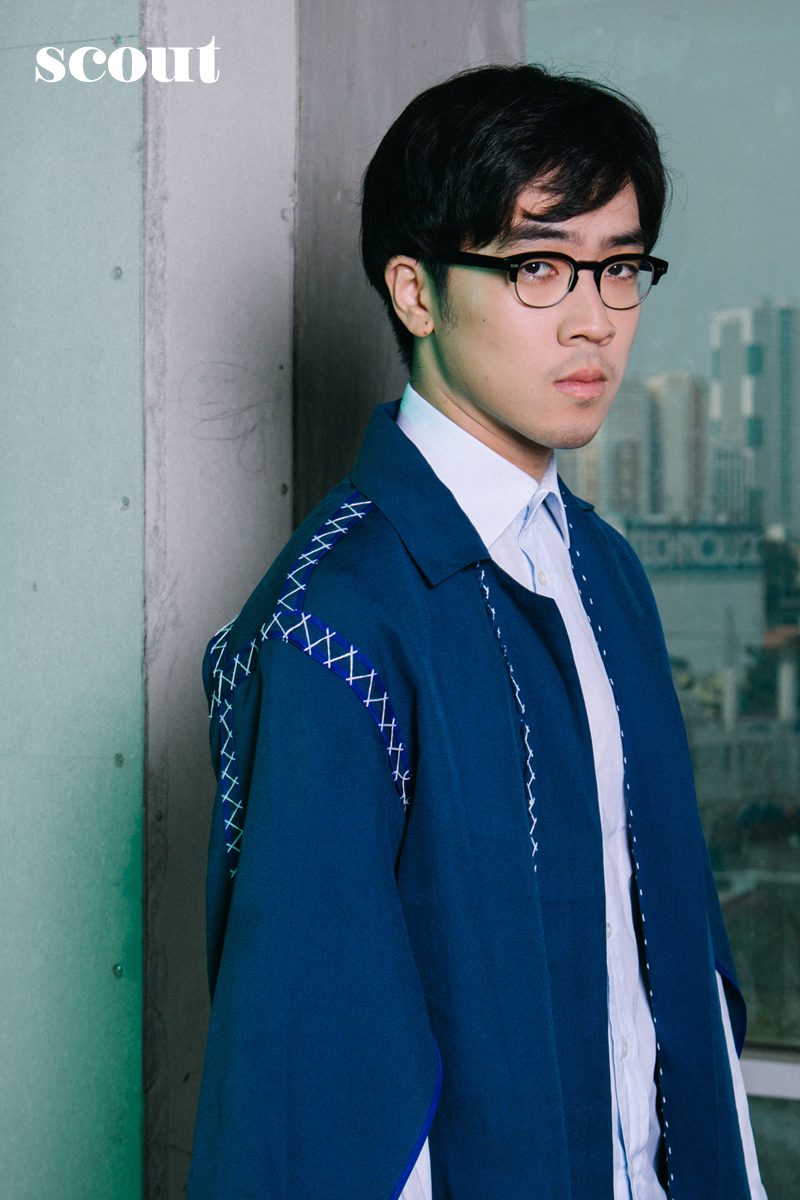
For him to make music is too much. Too much to add to his charm caught at a single glance. His 2016 release, TIME/SPACE is a vulnerable record checkered with emotional lyrics and falsettos. It’s a vulnerable doozy. His latest release, entitled CHECK-HOOK, replaces the strings for a drumbeat in his take on electronic music. The emotional depth still remains.
And yet, we are to meet and hang out for a couple of hours because of his music. He’s here as part of the Singapore Tourism Board’s project for a weekend long event involving him and other artists from Singapore. We had to reschedule because of his brush with condition days prior (food poisoning, of all things), but he’s here earlier than the rest of us, casually waiting in the lobby.
The first thing I notice is his pair of Rick Owens and during our pre-shoot banter he mentions his recent hobby of buying and selling shoes. If only the unassuming-cool-boy-trope couldn’t be more true. He’s a renaissance man.
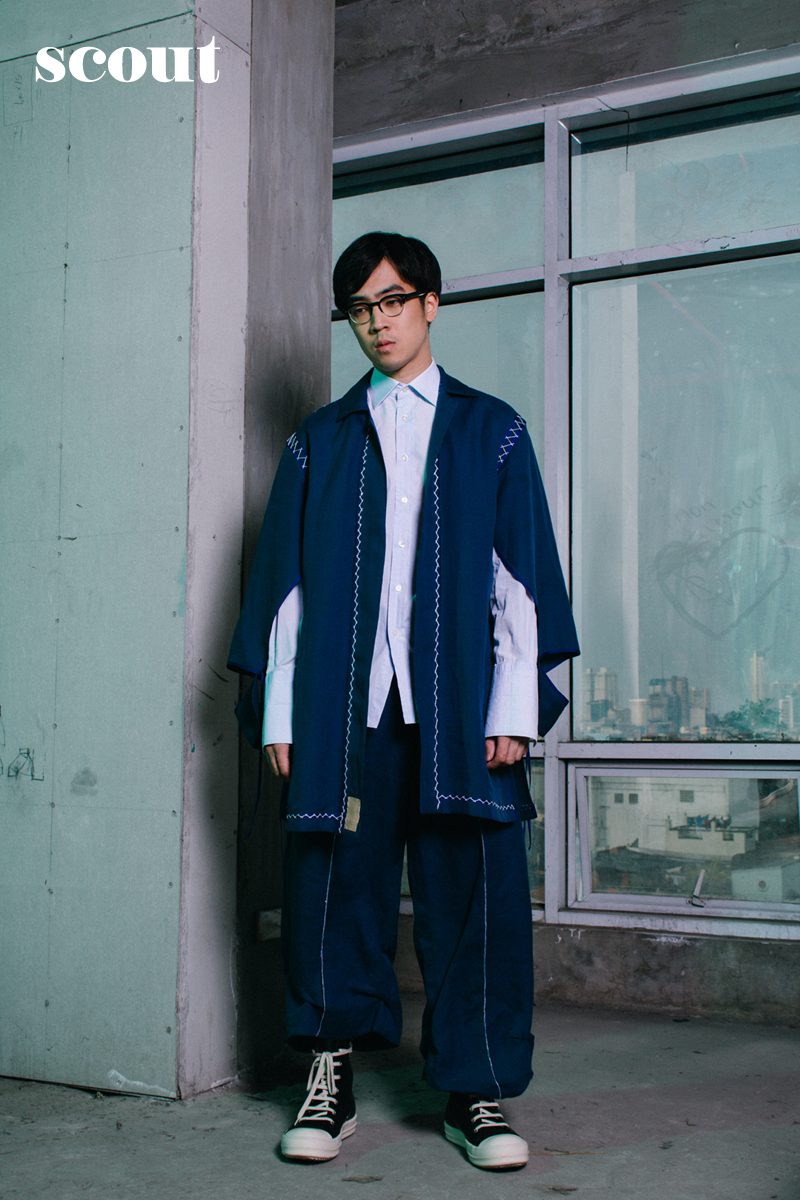
CARL JAN CRUZ evening shirt and trousers, carljancruz.com, stylist’s own button-down, Charlie’s own shoes
Or maybe he’s just that complete of a person, that he isn’t putting out a front or projecting a certain look because that’s just who he is. I believe that. If being cool means being in touch with who you really are, then Charlie Lim is a very cool person. The way he projects himself makes me feel like he has everything figured out. His introversion sits in contrast to his musicality but in actuality, they work hand in hand.
When Charlie talks, you can see his mind racing from the way he thinks over each statement thrown at him. He edits what he says as he says it, and while this interview edits some of his words for brevity you can see how measured he speaks about a certain subject by talking about it at length. He doesn’t just appear careful, but also filled with wonder, like he’s getting insights while gathering thoughts in his head.
Which also means he has a lot to say. We talk about his latest project, the music scene in Southeast Asia, and his advice for budding musicians in a very pleasant conversation:
Let’s talk about your music video for ‘Zero Sum’. Can you tell us more about the concept of the video?
I worked on it with a friend of mine, his name’s Jasper Tan. He does a lot of music videos for local Singaporean artists. We just kind of brainstormed a very rough outline of what the story might be, and a lot of it is just kind of self-explanatory when you watch it, which is pretty much me going insane on the streets of Tokyo. It pays homage to a kind of murder-mystery, thriller style. The way it’s shot is also very much like the style as well, it’s just him with a camera running around in doing quite unorthodox shit in a place like Japan which is a bit challenging I think, but thankfully we didn’t get stopped or arrested or anything.
People were just generally quite nice then. They were a bit shocked at first, but then they saw “oh he’s got someone filming” so [most of the] shots are just me just having a tripod attached to my crotch so… yeah, just walking around, pretending to be drunk, or just insane, or like, forgetting. It was quite challenging as well because we were there mostly to play at this festival called Summer Sonic, which was one of the main festivals in the region. And then between that and my meetings and interviews, we just decided to shoot the music video, so I think it all kind of fed into just the whole insanity, which is like, you know, we were all very tired and kind of frantic. So it kinda fed into the vibe of what the video was about. Yeah, we just did cameos as well. My fiance was with me, so she actually played the girl in the red dress.
Is it just a single? Is it part of an upcoming album?
Yeah. The album’s already out, and it’s the second single off that album. The album is called CHECK-HOOK.
Let’s start with the name of the album. Why the name? Why CHECK-HOOK?
CHECK-HOOK is actually a boxing reference. It’s a boxing move where basically you pivot around the opponent when he’s charging at you while throwing the hook. It’s quite a hard move to pull off, but when done very well, it’s a great way to kind of regain control of the fight. It’s kind of like a matador controlling a bull in a bullfight.
You box?
Yeah, I picked it up about two years now. I guess this is like my own take on not just music, but my own life, I guess. Just sort of gaining control again, trying to find a good reason to be making music, finding why I do what I do to make sure I’m in control and I’m happy with what I put out? So I suppose this [applies] on a few levels, existential or otherwise.
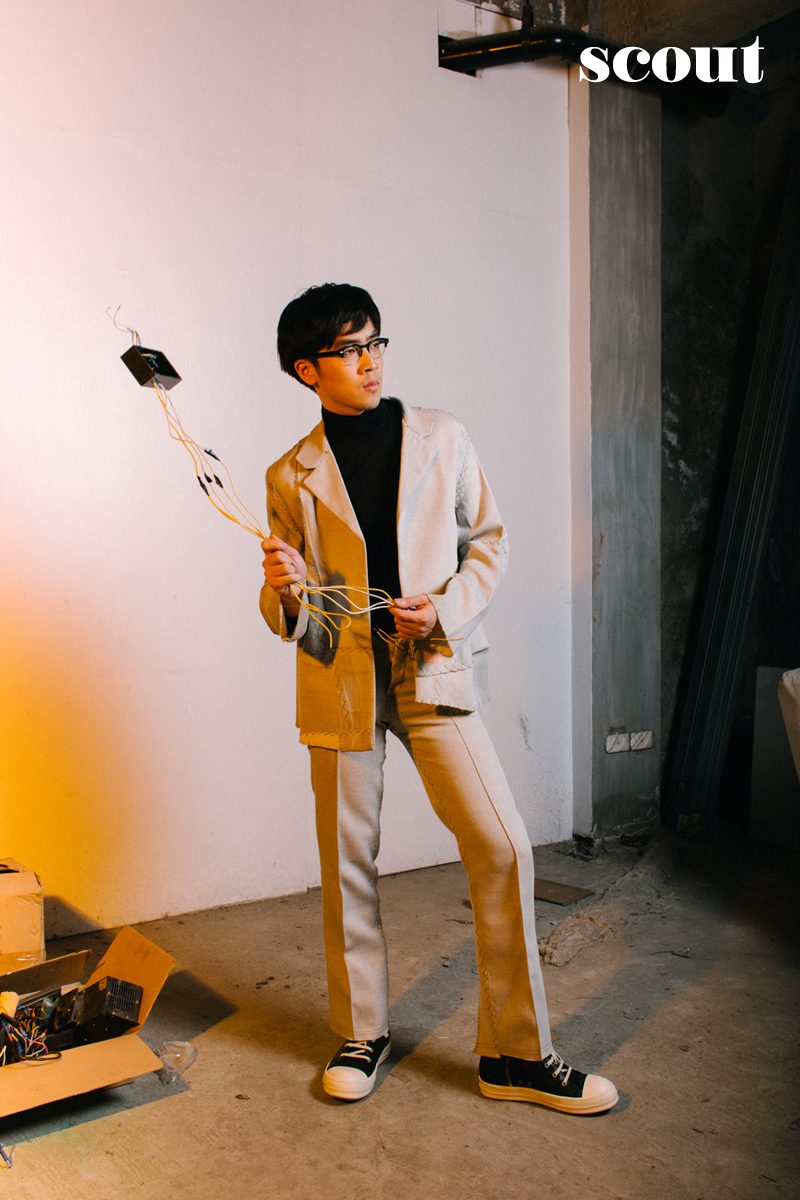
CARL JAN CRUZ jacket and trousers, carljancruz.com, stylist’s own turtleneck, Charlie’s own shoes
You’ve been making music for quite some time now.
My last album was called TIME/SPACE, and it took about three years to make. It’s a very singer-songwriter style album. That also took a lot out of me, so I needed time to like go away, recharge, rethink, and sort of challenge myself again. So this new album is quite different in terms of production and arrangement. At the end of the day I’m still a singer-songwriter, I can play my songs on guitar and piano, but I really like to challenge myself on the production level as well as the arrangement level, so a lot of the songs are using a lot of dance music tropes and kind of subverting them. In a way, it’s kind of like my take on dance music. I always say it’s like dance music but for people who don’t go to clubs, like myself. So yeah. It’s something like that, I just… I wanted to hear, but wasn’t really out there?
I mean, sonically it’s very different, the two albums. But conceptually, if you could summarize what you were trying to say in your last album (TIME/SPACE) in a few sentences?
TIME/SPACE, I guess, was like a slow burner I suppose. A lot of it was just really really being reflective. I was always in transit, I was moving between countries. I was in a couple of long distance relationships, and yeah, which I suppose really kind of broke me but also made me, in a way, made me a lot stronger. So yeah, I think writing that over a period of like three, four years, which is quite an accurate reflection of where my headspace was. It’s quite a heart-on-sleeve record, I think. It’s quite earnest and kind of bittersweet, I suppose.
I was just checking the comments for “Zero Sum” and it said when you put the greatest local musician and the greatest local cinematographer together, you get something beautiful.
Aww. I haven’t read that yet but that’s very nice.
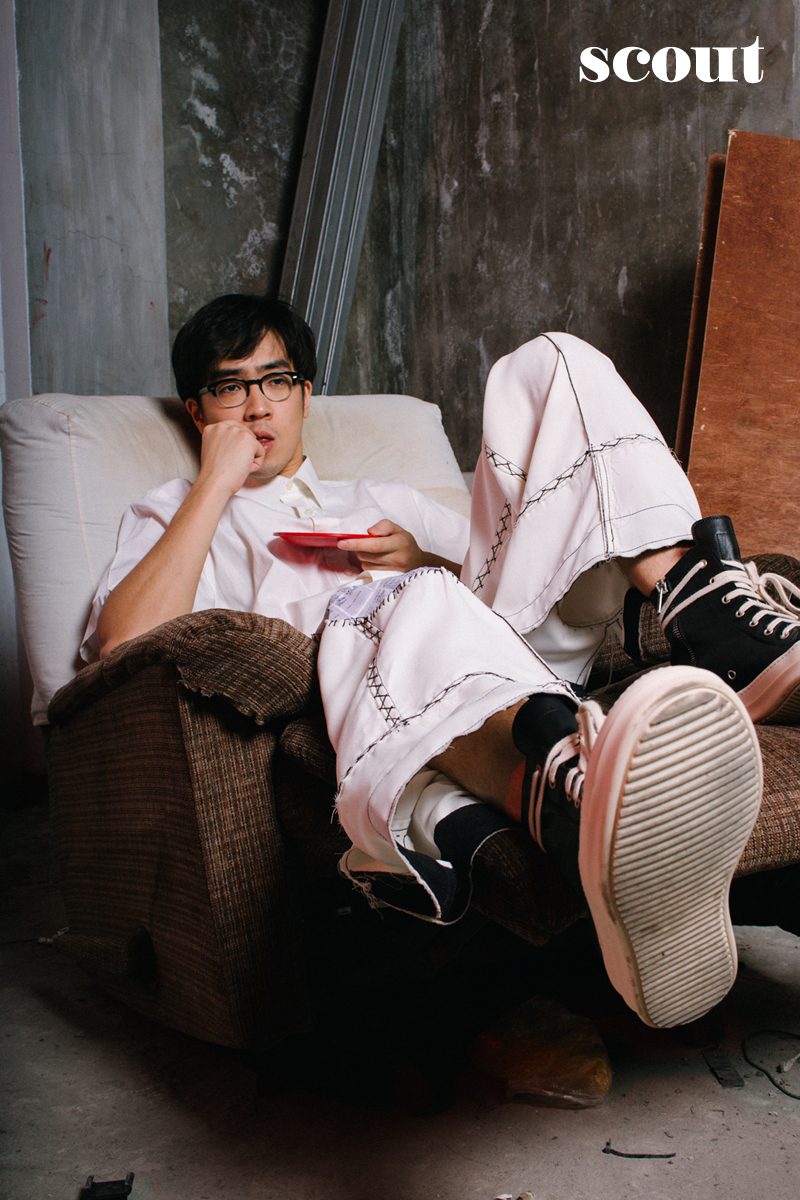
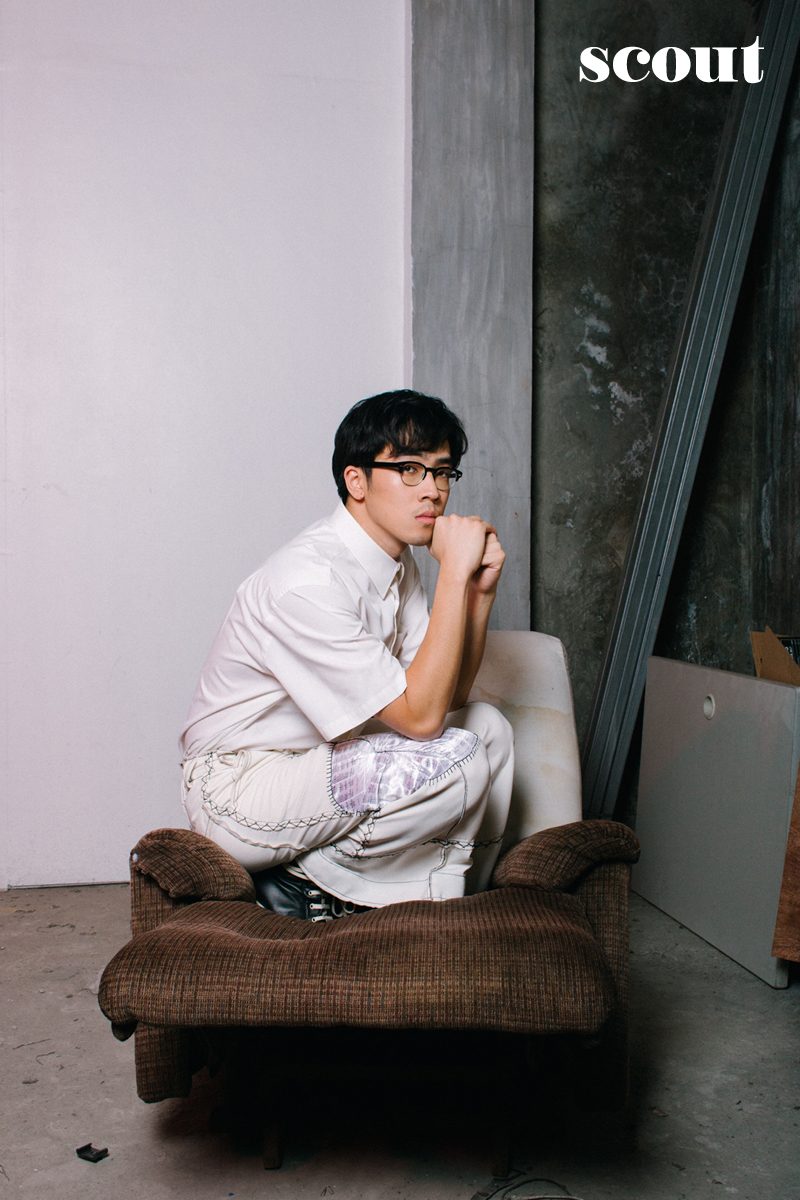
CARL JAN CRUZ pants, carljancruz.com, stylist’s own button-down, Charlie’s own shoes
What are your thoughts on how you’re being received in Singapore? Do you agree with being called the greatest local musician from Singapore?
No, I absolutely don’t take that. It’s never about you. You know, you’re only as good as the people you work with, the people behind you. I’m just… I dunno. I’ve been very blessed to be in the position where I can just make the music I wanna make and not worry about pandering to people.
I think, and to be respected to be in that position, like, that’s a real blessing and privilege. I don’t know, I don’t think much about what my place is in the music scene in Singapore, in Southeast Asia so much, I just wanna keep doing what I do and hopefully people like it, you know?
What’s your definition of success when it comes to being an artist? Since you mentioned you don’t really care much about how you’re being received?
I think it would be dishonest to say that I didn’t care what people thought or, you know, as if external validation didn’t make me feel better. I think, like, everybody wants validation or fame to some extent. But to trust it for more than what it’s worth at face value, that’s a bit dangerous, I suppose?
“I think success is just being able to do what I love at a very high level and to keep improving in your craft.”
I think success is just being able to do what I love at a very high level and to keep improving in your craft. I don’t think that anybody ever arrives or makes it, to be honest? I think you just keep at it, and if you’re able to sustain yourself with people that you respect, then… If I get to travel the world and play to new audiences, I think that would be really nice.
What’s the music scene like in Singapore?
We’re a very young country with a very small population, unlike places like Manila or Indonesia. But at the same time, we’re very connected, I guess. [We’re all] very supportive, even though the genres of music might be quite different. There’s definitely been a growth spike over the last maybe 10 years, five years alone I’d say. There’s also a bit of government support for original music to be made now, which is nice. We have more venues to play original music, and bigger festivals are letting local bands and regional bands, you know, play smaller stages and open for international artists, so that definitely helps boost the profile of bands, give them more exposure.
So I think there’s no better time to do music, or you know, original content than now. Especially with technology and, you know, everything being so interconnected. But I think also, because we’re such a young country, we’re still struggling to find our own sound. I also think it’s also something not worth worrying about because you just do it and then a sound gets formed.
It would be a bit contrived, I think, to just go, “oh, you know, I wanna sound Singaporean,” or, “I wanna create a Singaporean sound,” I don’t think that happens. For me, like, you can only probably recognize it after a period of time has passed.
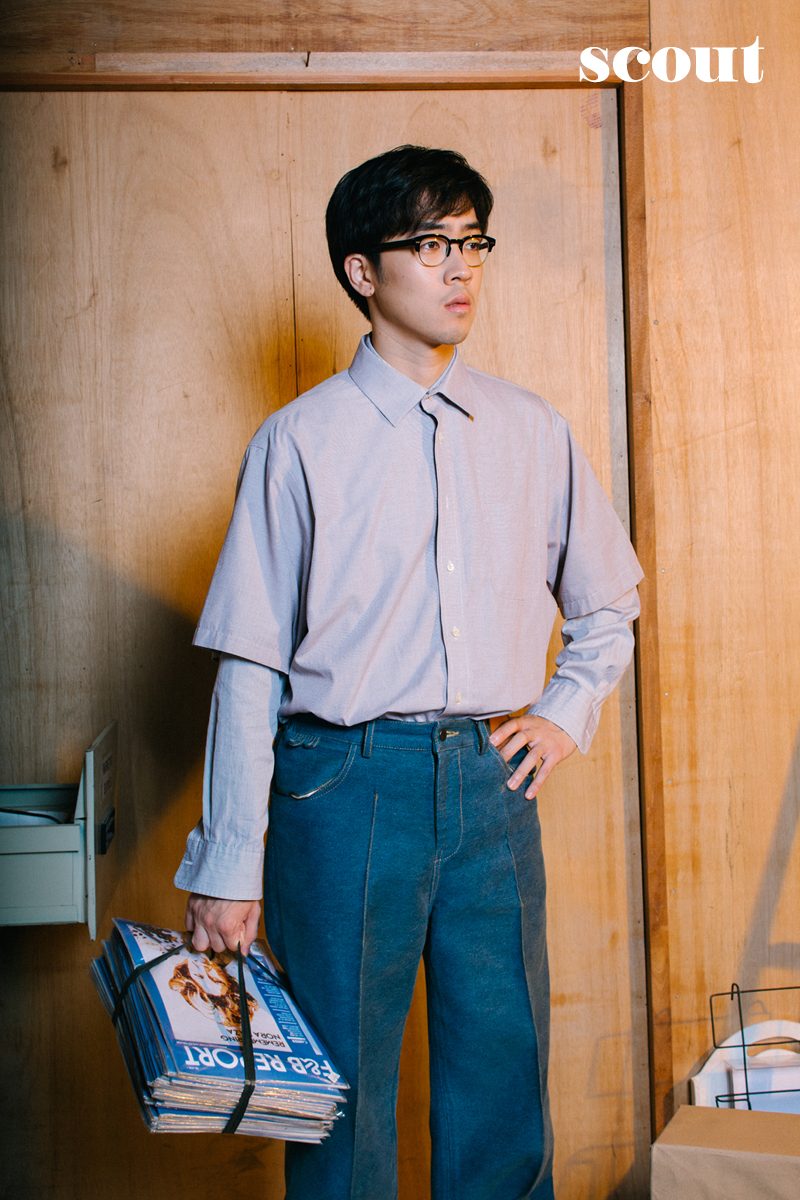
CARL JAN CRUZ jeans, carljancruz.com, stylist’s own button-down
Are you familiar with any recent Filipino artists?
Recent? Because I know these guys have been putting out music quite consistently. Mostly singer-songwriters. I heard of Keiko Necessario recently, I think her production’s pretty nice as well. Very catchy. Clara Benin. She’s got a great voice. She’s amazing. She’s a very talented singer-songwriter. When I first came here in 2012, my friend Carlos Castaño, he brought me around and introduced me to a few local bands and yeah. He’s a singer-songwriter himself. I think he’s in a couple of bands so everyone’s really just talented here. I think that’s one thing that Manila is definitely, the Philippines is definitely renowned for, which is really good musicianship everywhere. I think we, in Singapore, really look up to you guys.
“…there is definitely good content coming out of Southeast Asia right. But at the end of the day, there’s a huge machine behind this whole… behind what drives culture, what happens in Hollywood, that kind of just trickles down.”
That’s good to hear. Because there’s an issue, well, not really an issue, but what I’m getting at is you found out about these artists through personal recommendations or through actually being here. And then coming from us, we find out about artists from other countries through streaming services, and you know, it’s always the Top 40, it’s always these top charts, and you know, we find out mostly about these Western artists. These American or European artists. Probably what I’m getting at is that really in Southeast Asia, we don’t really have much, like, I would say interaction? Or is that just me or am I just being naive? What do you think?
No, not at all. I think what you’re getting at is it’s a very big topic to unpack. It’s not just about music or content point of view. Because there is definitely good content coming out of Southeast Asia, right? But at the end of the day, there’s a huge machine behind this whole… behind what drives culture, what happens in Hollywood, that kind of just trickles down. The soft power of the US or the UK can’t be underestimated. So much of that dictates the way we consume music, or even the way we make music. But I grew up with Western pop, even though I’m Chinese-Singaporean. Maybe in some sense, maybe we are trapped in this system that the West has created, because it has this very strong sense of identity, and this very strong machinery behind the whole system. But then again, there’s more and more attention being… a few spotlights here and there are on Asian artists.
You could argue that, you know, it’s a big community, or it’s tokenism and all that, but you know, we need baby steps I think. All we can do is try to make the best content that we can. And whether it’s a gimmick or we’re just trying to gain attention, at the end of the day, it’s a very tough industry—and which is why when you ask me about success, it’s scary because if you base success on validation alone, or how famous you are, it’s a slippery slope because you have to play so many games or jump through so many hoops to get to a point that you think is successful or to a level like some of these Western artists, right?
I’m not saying that you know, we shouldn’t do it but we have to understand that there are many variables involved and yeah, the odds are against us. So why play their game? That’s what I’ll ask. I think we can be inspired by what they do, but we shouldn’t be discouraged by it. It’d be easy to be discouraged, but let’s not be… that’s why we gotta support each other.
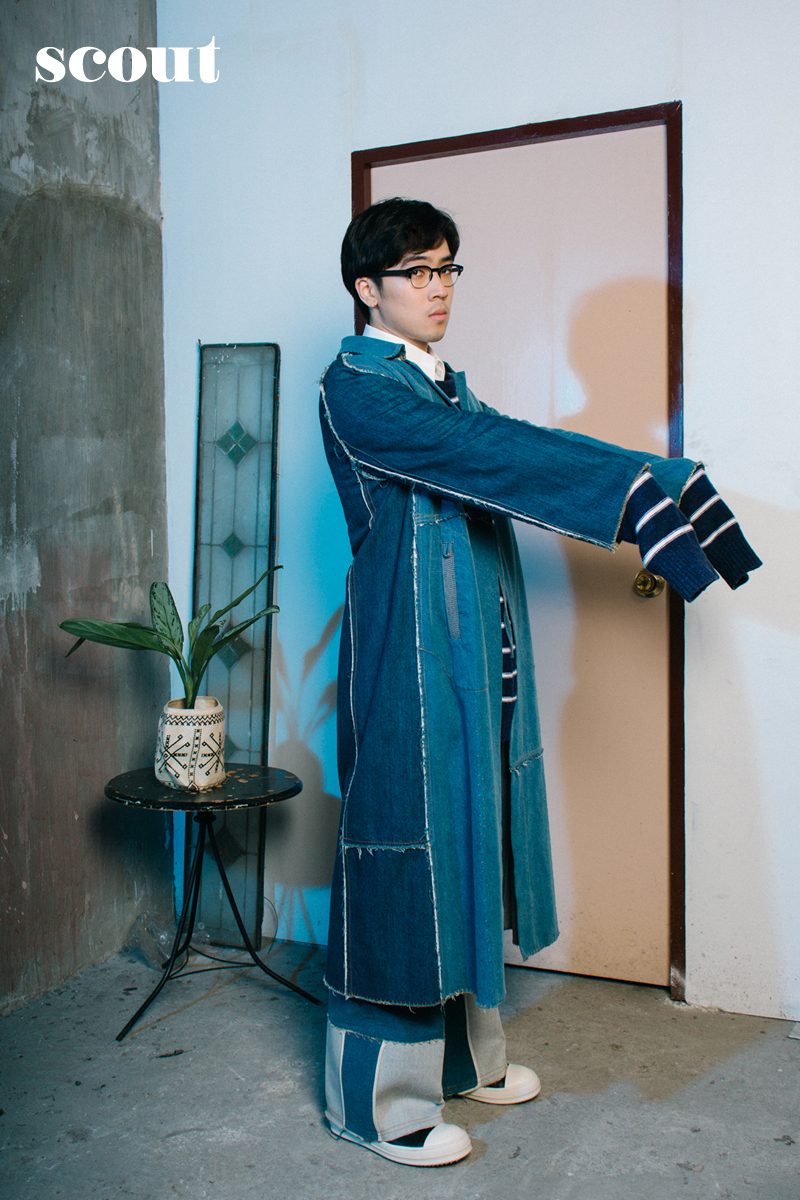
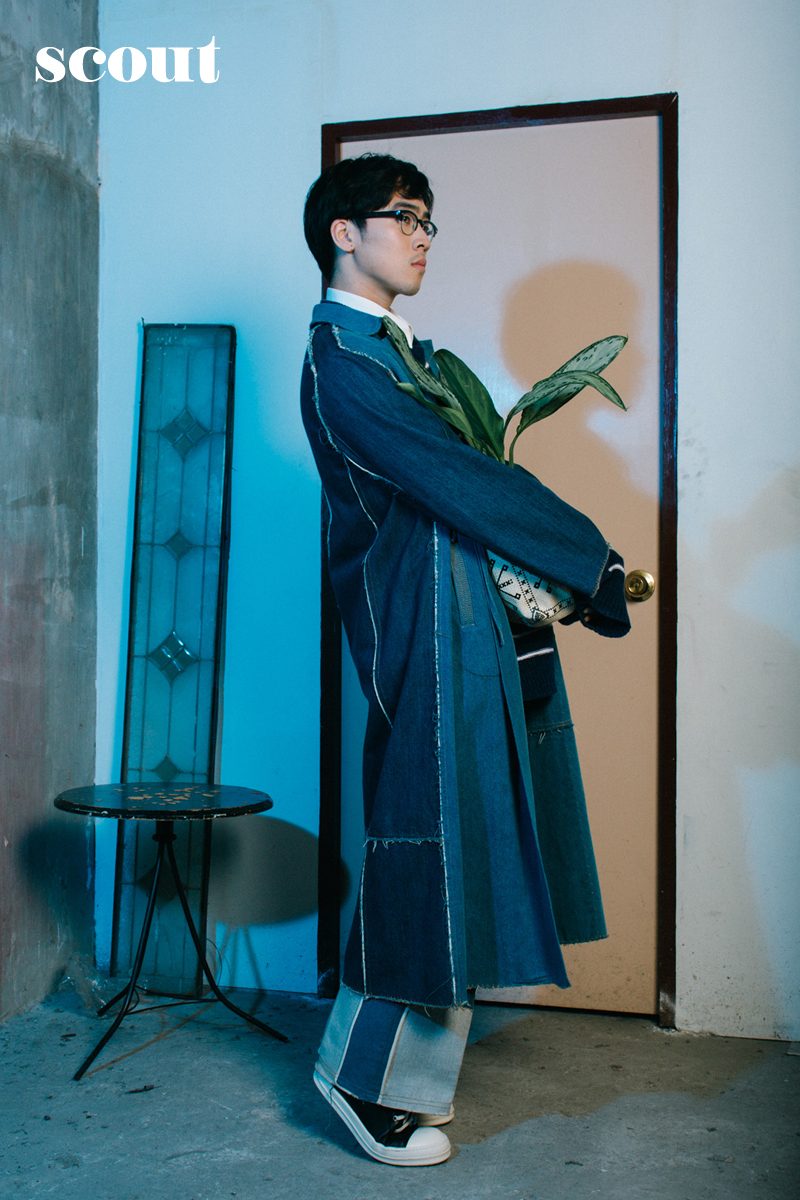
CARL JAN CRUZ denim coat and jeans, carljancruz.com, stylist’s own button-down and striped sweater, Charlie’s own shoes
My question is, how can we support each other? Coming from my perspective as a listener and not an arist, I don’t necessarily have an in on knowing what’s going on in Singapore, what’s going on in Indonesia, what’s going on in all these other Southeast Asian countries. And then, once I get to know more about these artists, for sure I’m going to like them. But the fact is, there’s no, I guess I could say interaction or platform for these interactions to happen.
But it starts from somewhere. I mean, the fact that we’re having this interview now is amazing. I’m from Singapore and I’m doing an interview here now in Makati at nine in the morning on a Saturday. Thanks, guys. To me, that’s probably unheard of 10, 20 years ago, you know? The fact that we’re in our 20s, 30s doing this here and by sticking it to the man, that’s really very encouraging. And the younger generation, even the younger generation, they’ll look at this and they’ll go, “oh, they’ve done that, we can do it, too. We can push it even further.”
So we just need to have faith. And we might not see it or, you know, reap the results that we hope to see in our lifetime, but we just have to have the faith that what we do will pave the way for more people. Yeah. I think also because, like, we’re such an impatient generation. We’re just built for instant gratification. I’m definitely guilty of it. It’s probably important to just take a step back sometimes and just remember that things take time.
“And there’s this saying that if you love what you do, you’ll never work a day in your life. I think that’s complete bullshit. I think you’ll work much harder than if you were to get, like, a day job. Because it consumes you completely.”
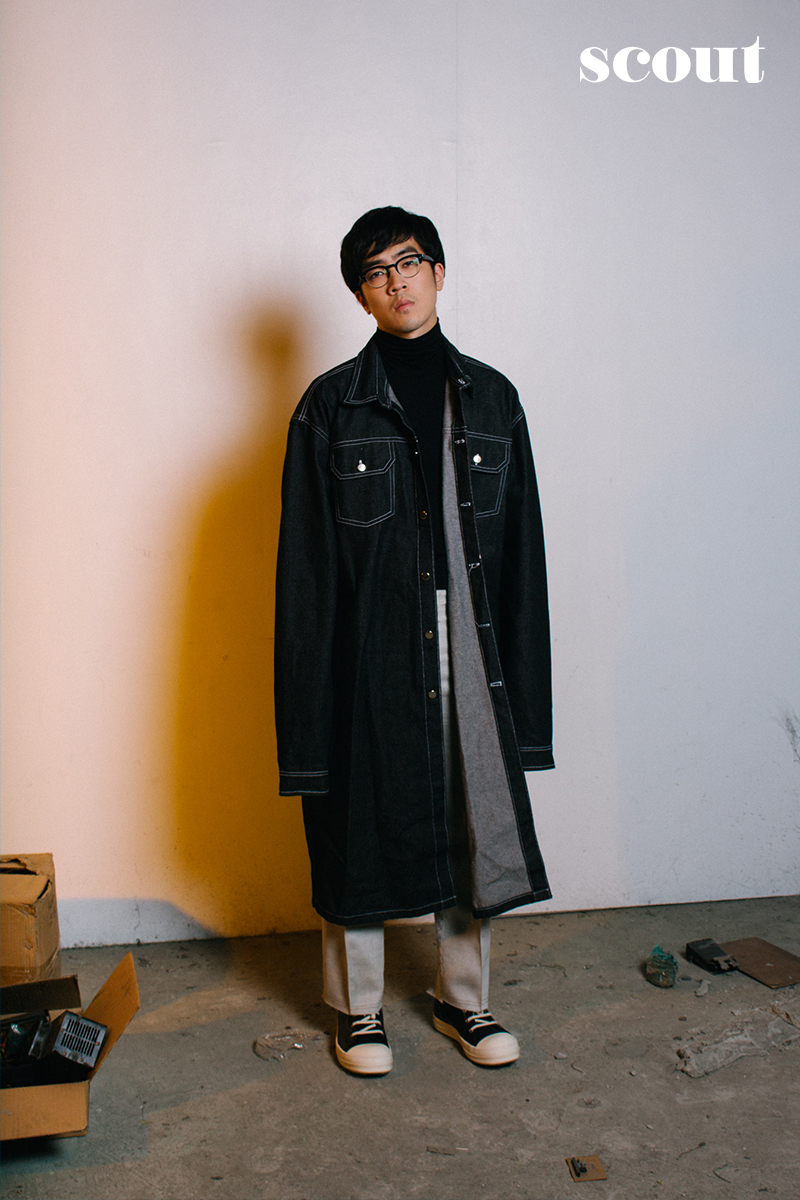
PROUDRACE denim coat, proudrace.com, CARL JAN CRUZ trousers, carljancruz.com, stylist’s own turtleneck, Charlie’s own shoes
I was going to ask if you have any advice to give to aspiring singer-songwriters like yourself.
Just being really patient. And working really hard. I think sometimes you just have to be crazy enough. Like I went into this just being, like, really dumb and naive, thinking that it’ll be a lot easier, which it really isn’t. Yeah, so you just have to be crazy enough.
And there’s this saying that if you love what you do, you’ll never work a day in your life. I think that’s complete bullshit. I think you’ll work much harder than if you were to get, like, a day job. Because it consumes you completely.
And you just have to be ready for it. And you somehow have to find balance amid all the craziness and still like, maintain being a decent human being. And you start to see why, like, why people go insane, or why people get dependent and addicted to things that aren’t great for you, right? It’s a tough industry. So I think that people who want to be in music or entertainment or art have to be prepared to go through a lot of burnout and a lot of stress.
Photography by Renz Mart Reyes
Styling by Oliver Emocling
Grooming by Janica Balasolla
Assisted by Jelou Galang


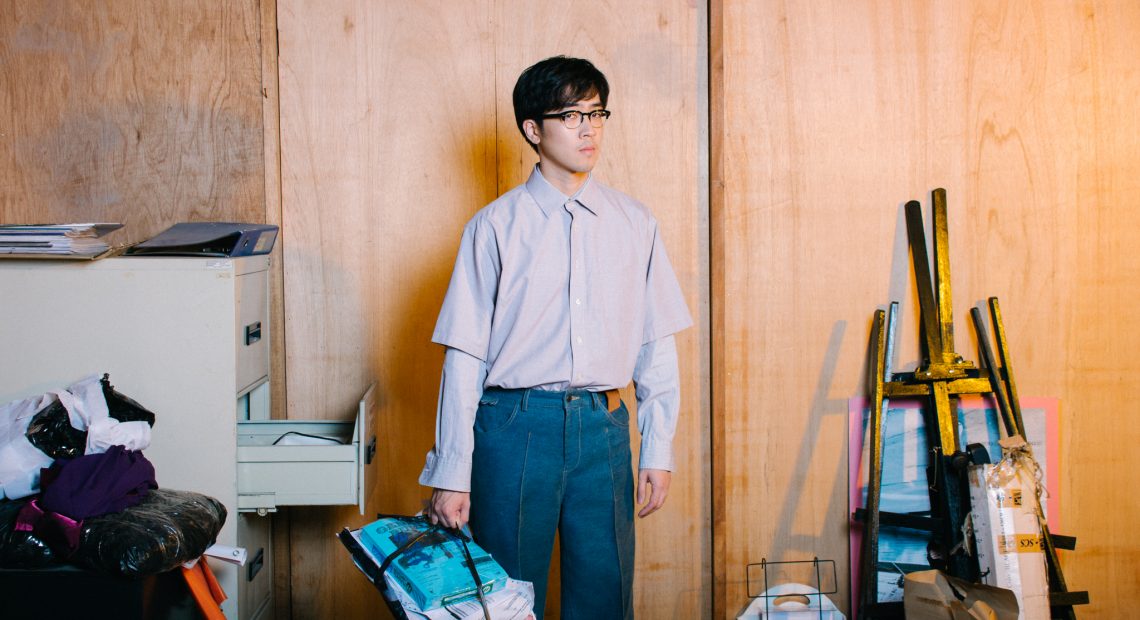






















Comments